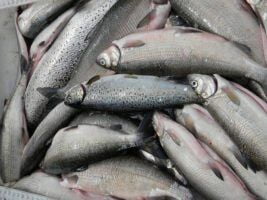

Environment
Rio 2016 Serves Up Sustainable Seafood
Attendees of the Olympic and Paralympic Games will enjoy sustainably and responsibly sourced seafood, thanks to an extraordinary effort by the Rio 2016 Olympic Organizing Committee and its partners.
More than 70 tonnes, equivalent to more than 350,000 portions, of seafood served to athletes and media at the Games will come from fisheries or farms which meet the requirements of the Marine Stewardship Council (MSC) or Aquaculture Stewardship Council (ASC). This represents the most sustainable seafood offering to date of any Olympic or Paralympic Games.
Seafood served with the green ASC or blue MSC label can be traced right back to fisheries and farmers that are independently certified as meeting globally recognized standards for sustainable wild fishing or responsible farming. The fishers and farmers who produce this seafood go to great lengths to reduce their impacts on the environment, preserve oceans and safeguard seafood supplies for the future.
Julie Duffus, Sustainability Manager at the Rio 2016 Organising Committee for the Olympic and Paralympic Games said: “Millions of people attending this year’s Games will be able to enjoy sustainably and responsibly sourced seafood knowing that they are helping to support thriving fishing and farming communities and to protect the environment. By choosing seafood with the MSC or ASC label they will reward responsible producers from around the world.”
Included on various menus within the Olympic Village, Media Village and media centres are: ASC certified responsibly farmed Brazilian tilapia from Netuno and Chilean salmon from Los Fiordos; and MSC certified wild-caught Icelandic cod from Visir and Canadian chum salmon for Albion. McDonalds Brazil will also serve 100% MSC certified Argentine hoki in its McFish sandwiches throughout Brazil during the Games.
Delivering its commitment to sustainably and responsibly sourced seafood has required the Rio 2016 Olympic Organizing Committee and its partners to bring new supplies of certified seafood to Brazil. As a result, numerous farms and fisheries across the region have taken steps to improve their environmental performance in order to meet the industry leading standards set by the MSC and ASC.
Duffus said: “The Olympic and Paralympic Games are unique in their ability to bridge cultural divides, reach a broad audience and generate a sense of fellowship and possibility. We hope that this commitment will have a lasting legacy of sustainable sourcing and seafood consumption in Brazil.”
Rupert Howes, Chief Executive of the MSC said: “The volume of sustainably sourced seafood at this year’s Olympic and Paralympic Games shows what is possible when suppliers, caterers and the public work together to support sustainable choices for people and the planet. MSC certified fisheries currently catch around one tenth of all wild seafood. We hope to see this proportion grow as recognition of the importance of sustainable seafood increases.”
The volume of sustainably sourced seafood at this year’s Olympic and Paralympic Games shows what is possible when suppliers, caterers and the public work together to support sustainable choices for people and the planet.
Chris Ninnes, Chief Executive of the ASC said: “With this landmark commitment by the Games, local suppliers and caterers can showcase the best of Brazilian cuisine to a global audience and create lasting change by emphasising the importance of making the right choice when buying seafood. With more than 1 million tonnes of ASC certified product in the market, the public can join the effort to preserve fish for future generations by buying from producers who share their goals to protect vital ecosystems and care for those who work on the farms and live in surrounding communities.”


 Features11 months ago
Features11 months agoEco-Friendly Cryptocurrencies: Sustainable Investment Choices

 Energy11 months ago
Energy11 months agoThe Growing Role of Solar Panels in Ireland’s Energy Future

 Energy10 months ago
Energy10 months agoGrowth of Solar Power in Dublin: A Sustainable Revolution

 Energy10 months ago
Energy10 months agoRenewable Energy Adoption Can Combat Climate Change




























